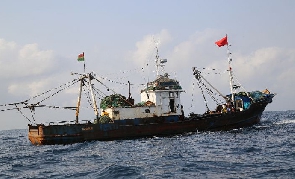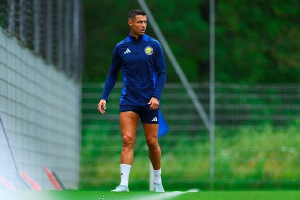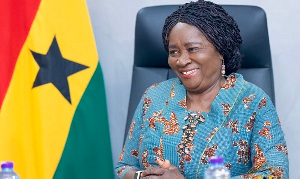Government has moved to enact a new Fisheries Act that will incorporate measures to tackle unreported and unregulated fishing and prescribe stiffer sanctions against infractions of the nation’s fisheries laws.
The fisheries ministry has also initiated processes towards the preparation of a new marine fisheries management plan for the next five years, with plans to procure four patrol vessels and a research vessel.
These efforts, according to Fisheries and Aquaculture Development Minister Mavis Hawa Koomson, are part of reforms to help the nation tackle the menace of illegal, unreported and unregulated (IUU) fishing and allied fisheries crimes.
The minister disclosed this in Tema on Wednesday when she opened a new regional monitoring, control and surveillance centre (RMCSC) to help curtail IUU fishing and other fisheries-related crimes.
She said IUU fishing and other fisheries crimes remain worrisome to the government due to their negative impact on fisheries resources and the loss of revenue to the state, describing the newly opened facility as a timely intervention.
“No single country can combat IUU fishing, and the launch of the RMCSC has come at an opportune time. Now is the time for us to collectively tackle the menace,” she added.
“Through this facility and other efforts of the FCWC (Fisheries Committee of West and Central Gulf of Guinea) and its partners, the menace of IUU and other emerging issues confronting the fisheries sector, such as maritime security, could be dealt with in a more decisive manner.”
Unreported and unregulated fishing continue to undermine sustainable marine fisheries across West Africa, with high economic losses and increasing levels of marine insecurity along the Gulf of Guinea region. The practice costs the fisheries economy an estimated US$300m annually.
The monitoring facility, established by the Fisheries Committee of West and Central Gulf of Guinea (FCWC), an intergovernmental fisheries supervisory body, will undertake vessel monitoring and analysis to support coordinated efforts of fisheries inspection at port and at sea. It will also host a regional record of authorised and IUU-listed fishing vessels.
The centre was funded under the European Union’s Improved Regional Fisheries Governance (PESCAO) project, which is investing some €16.5m into the tracking and monitoring of fishing activities across the sub-region.
Ambassador and Head of the European Union Delegation to Ghana, Diana Acconcia, said the core aim of the PESCAO project is to improve fisheries governance through better coordination of national fisheries policies.
The RMCSC, she said, will be paramount in enhancing regional cooperation in the fight against IUU fishing.
“IUU fishing depletes fish stocks, destroys marine habitats, distorts competition, puts honest fishers at a disadvantage and weakens coastal communities, particularly in developing countries. The EU is firmly committed to eradicating IUU fishing around the world and is taking strong and structured action towards this goal.”
Business News of Friday, 14 May 2021
Source: business24.com.gh
Govenment takes steps to tackle fisheries-related crimes
 The cost of illegal, unreported and unregulated (IUU) fishing to the industry is estimated at US$300
The cost of illegal, unreported and unregulated (IUU) fishing to the industry is estimated at US$300












